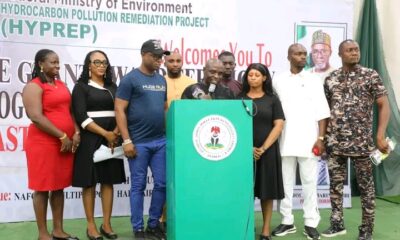Health
Arthritis And Herbs (I)
If you feel a twinge in your knee always, or get a sharp pain shooting down your leg from your hip to your calf then you may be in with “Arthritis”. Doctors used to think of it as a disease of old age, but they now believe that this form of degeneration disease also affects those in their 40s and 50s.
There is “Osteoarthritis”, a degenerative disorder in which the cartilage – the natural shock absorber that cushions the insides of your joints-begins to break down. There is also “Rheumatoid” arthritis which causes pains and swellings at different parts of the body.
The danger about arthritis is that it starts undetected for a long time so by the time you begin to feel those telltale twings, signifies that the disorder may be starting to affect your bones. What doctors would like to have is some kind of test that will identify people in the earliest stages of Osteoarthritis, before too much damage has occurred.
Both on the type and on the philosophy of the physician, but generally it involves aspirin, and other pain killers, anti-inflammation drugs, including injections.
Less conventional treatment include, acupuncture, chiropractic and herbs, including nutrition. We shall discuss the last two herbs and nutrition and their effects in combating this common ailment.
1. Nutrition: It was Dr. Norman Childers of Rutgers University who first gave a glimpse of the link between Arthritis and nutrition. He found that cows that fed on weeds and grasses of the nightshade family develop swollen joints such that they always kneel rather than stand normally. Weeds of the nightshade family include -pepper, except black pepper, tomato, white Potato and eggplant. When he tried the experiment on humans asking them to avoid these foods, he surprisingly saw marked improvements.
A recent research at the US Department of Agriculture further indicate that foods from the nightshade family may heavily contribute to arthritis.
For those who want to checkmate their malaise naturally, it’s recommended that you keep away from tomatoes, white potatoes and garden eggs, at least for the mean time until the situation improves.
2. Herbs: Garlic is one herb that tops the herbalist list as a potent cure to several ailments. In Russia it’s extensively used in the treatment of rheumatism and arthritis. It has huge anti-inflammatory properties that accounts for its effectiveness in the treatment of rheumatic afflictions.
Apart from lowering blood pressure and tension, garlic has the power to ease spasm of the small arteries. It also relieves symptoms of dizziness, shortness of breath and formation of gas within the digestive tract. The average dosage should be two to three capsules of garlic daily.
Alternatively, one can get a fresh garlic clove pounded or crushed and drink the liquid. Swallowing raw cloves of garlic is not encouraged since it may take time to break down in the stomach.
Health
‘How Micro RNA Research Won Nobel Prize’
Two United States scientists who unraveled the human micro RNA have won the Nobel Prize in Physiology or Medicine 2024.
Victor Ambros and Gary Ruvkun won the coveted prize for their work on microRNA as their discoveries help explain how complex life emerged on earth and how the human body is made up of a wide variety of different tissues.
MicroRNAs influence how genes – the instructions for life – are controlled inside organisms, including humans.
Every cell in the human body contains the same raw genetic information, locked in our DNA.
However, despite starting with the identical genetic information, the cells of the human body are wildly different in form and function.
The electrical impulses of nerve cells are distinct from the rhythmic beating of heart cells. The metabolic powerhouse that is a liver cell is distinct to a kidney cell, which filters urea out of the blood.
The light-sensing abilities of cells in the retina are different in skillset to white blood cells that produce antibodies to fight infection.
So much variety can arise from the same starting material because of gene expression.
The US scientists were the first to discover microRNAs and how they exerted control on how genes are expressed differently in different tissues.
The medicine and physiology prize winners are selected by the Nobel Assembly of Sweden’s Karolinska Institute.
They said: “Their groundbreaking discovery revealed a completely new principle of gene regulation that turned out to be essential for multicellular organisms, including humans.
“It is now known that the human genome codes for over 1,000 microRNAs.”
Health
WHO Begins Regulation On Antibiotic Waste
The World Health Organisation (WHO) has begun acting to curb effects of antibiotic pollution.
The new guidance on wastewater and solid waste management for antibiotic manufacturing sheds light on this important but neglected challenge ahead of the United Nations General Assembly (UNGA) High-Level Meeting on antimicrobial resistance (AMR) taking place on 26 September 2024.
The emergence and spread of AMR caused by antibiotic pollution could undermine the effectiveness of antibiotics globally, including the medicines produced at the manufacturing sites responsible for the pollution.
Despite high antibiotic pollution levels being widely documented, the issue is largely unregulated and quality assurance criteria typically do not address environmental emissions. In addition, once distributed, there is a lack of information provided to consumers on how to dispose of antibiotics when they are not used, for example, when they expire or when a course is finished but there is still antibiotic left over.
“Pharmaceutical waste from antibiotic manufacturing can facilitate the emergence of new drug-resistant bacteria, which can spread globally and threaten our health. Controlling pollution from antibiotic production contributes to keeping these life-saving medicines effective for everyone,” said Dr Yukiko Nakatani, WHO Assistant Director-General for AMR ad interim.
Globally, there is a lack of accessible information on the environmental damage caused by manufacturing of medicines.
“The guidance provides an independent and impartial scientific basis for regulators, procurers, inspectors, and industry themselves to include robust antibiotic pollution control in their standards,” said Dr Maria Neira, Director, Department of Environment, Climate Change and Health, WHO. “Critically, the strong focus on transparency will equip buyers, investors and the general public to make decisions that account for manufacturers’ efforts to control antibiotic pollution.”
Health
Kebbi Harmonises Doctors’ Salaries To Curb Brain Drain
In a concerted effort to curb brain drain, the Kebbi State Government has harmonised medical doctors’ salaries to be at par with their colleagues in the federal government’s tertiary health facilities.
Kebbi State Commissioner for Health, Musa Inusa-Isma’il, disclosed this at the handing over of ambulances to the state-owned health facilities at the Ministry of Health in Birnin Kebbi yesterday.
Inusa Isma’il, according to a statement by Ahmed Idris, the Chief Press Secretary to the governor, said the essence of the harmonisation was to retain the existing medical doctors and attract more to the services of the state.
According to him, the doctors across the state had already started enjoying the new salaries from August 2024.
He said the release of the vehicles was in fulfilment of Governor Nasir Idris’ promise to uplift health care services in the state.
“His Excellency said I should inform you, the beneficiaries of this gesture, that the vehicle should be strictly used for the intended purpose. It should not be used for anything else.
“If there is no referral case, each of the vehicles must be parked at the hospital by 6 pm. The governor said you should warn your drivers against reckless driving as well as violating the instructions.
“We should also do everything possible to reciprocate the gesture by working according to the terms and conditions attached,” he advised.
The benefiting health facilities included Sir Yahaya Memorial Hospital, Birnin Kebbi; State Teaching Hospital, Kalgo; General Hospital, Argungu; General Hospital, Yauri; General Hospital, Zuru; and General Hospital, Bunza.
In his speech, the permanent secretary of the ministry, Dr Shehu Koko, recalled that the ambulances were handed over to the ministry last Friday by the governor for the onward handover to the benefiting hospitals.
He observed that the ambulances would go a long way in improving the referral system in the state, adding that delays in reaching the secondary and tertiary facilities would be eliminated.
The permanent secretary attributed the high rate of maternal mortality in the country to delays in getting to the health facilities for proper medical care.
“We believe with the provision of these ambulances, part of the gaps we have in our referral system will be addressed, whereby patients who require secondary healthcare could be easily transported to secondary and tertiary health centres, where they can get such help,” he said.
In a goodwill message, Commissioner for Information and Culture Alhaji Yakubu Ahmed expressed gratitude to the governor for the support he has given to the ministry to excel.
While advising the beneficiaries to use the vehicles judiciously, the commissioner advised that services and maintenance of the vehicles must be prompt to derive the maximum benefits from the vehicles.
The commissioner also highlighted some achievements recorded by the government in the last year, including beautification of the state capital, completion of a multimillion-naira ultramodern state secretariat, road construction, construction and renovation of classrooms and upgrading of some health facilities, among others.
-
Business17 hours ago
Oil Production Resumption: Ogoni Youths Seek Inclusion In FG’s Plans
-

 News19 hours ago
News19 hours agoSenate Reshuffles Committees, Appoints New Chairmen For Dev Commissions
-

 Nation16 hours ago
Nation16 hours agoBizman Alleges Threat To Life …Seeks Police , Govt’s Intervention
-
Rivers17 hours ago
NOSDRA D-G Disburses N150m To 300 Farmers In Rivers
-

 Niger Delta15 hours ago
Niger Delta15 hours agoOgoni Postgraduate Forum Tasks HYPREP On Scholarship Scheme
-
Business17 hours ago
NCDMB Assures Greater Local Industry Participation In Oil, Gas Projects
-

 News19 hours ago
News19 hours agoNigeria Strengthens Economic Ties With Germany To Boost Investment, Jobs
-

 Featured16 hours ago
Featured16 hours agoFubara Flags Off Upgrading Of 135 Primary Healthcare Facilities In Rivers

